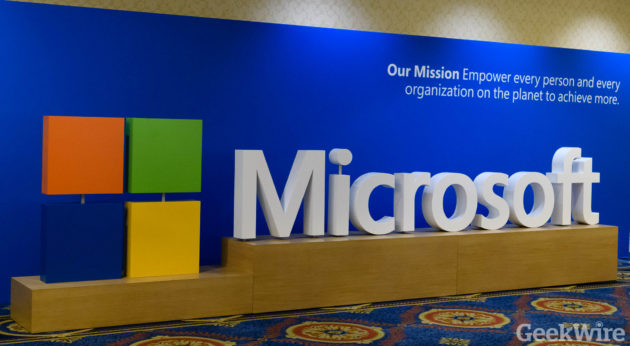
Updated at 3:20 p.m. with new details on ruling and appeal.
Current and former technical employees at Microsoft are not giving up on a push to expand a three-year-old gender discrimination lawsuit to cover thousands of women who have worked for the tech giant in recent years.
The legal team representing former high-ranking cybersecurity employee Katie Moussouris and current Microsoft employee Holly Muenchow has filed a petition to appeal a federal judge’s ruling denying class-action status on their lawsuit. This moves the dispute over class action status up to the Ninth Circuit Court of Appeals, while the general claims of the lawsuit have yet to be decided.
RELATED: Judge denies former Microsoft employees’ bid to expand gender discrimination suit against tech giant
The plaintiffs sought to expand their lawsuit to cover 8,600 women in technical roles that have worked at the company since 2012. U.S. District Judge James L. Robart denied the request after legal teams representing both sides presented their arguments in U.S. District Court in Seattle last month.
The case dates back to 2015, when Moussouris and Muenchow brought a gender discrimination lawsuit against the company, alleging “continuing policy, pattern and practice of sex discrimination against female employees in technical and engineering roles, including technical sales and services positions with respect to performance evaluations, pay, promotions, and other terms and conditions of employment.”
Moussouris worked at Microsoft from 2007 to 2014. In that time, she claims, she was given worse rankings than her manager told her she deserved, paid less than male peers, and passed over for promotion during her last four years at the company. She also alleged in the lawsuit that she complained about the director of her team, the Trustworthy Computing Group, for sexually harassing other women. The director has since been moved to another part of the group. Moussouris added in her deposition that she believes he retaliated against her by giving her a lower bonus, though the company says it found no evidence of that.
Muenchow, who has been working at Microsoft since 2002 and is still employed there, said in the lawsuit that she only progressed four levels in the company’s technical career track in the 16 years that she has been there. She believes that she was passed over for promotions even though she was qualified, and male colleagues were promoted. She said in her deposition that she has been criticized for being too assertive.
Microsoft argues that the plaintiffs were each promoted on several occasions and paid well. Moussouris in particular was among the highest paid in her “cost center,” making more than her male manager. But Microsoft contends her communication skills needed improvement, something Moussouris mentioned in her own-self evaluations.
The unsealed ruling, written by Judge Robart, contends that the plaintiffs didn’t adequately demonstrate a commonality to create a basis for the proposed class of plaintiffs, either in terms of impact or treatment of women at Microsoft.
The ruling says the plaintiffs’ commonality claims are invalid based on the arguments they make on a lack of standardization in the pay and promotion process. Therefore, the court says, since the plaintiffs’ argument centers on discretion, there is no common practice that can be applied to the proposed class. Also because of the discretion-based system, the court said that each plaintiff would have a different experience and Moussouris’ and Muenchow’s experiences could not represent those of the whole class.
Further, the court said that the plaintiffs could not adequately protect the class because the proposed class “presents irreconcilable conflicts of interest.” The proposed class, which includes more than 8,000 women in technical roles at Microsoft, also includes women who participated as managers in the calibration process used to determine pay and promotions that the plaintiffs argue was discriminatory.
After the ruling, Microsoft issued this statement: “We remain committed to increasing diversity and making sure that Microsoft is a workplace where everyone has an equal opportunity to succeed. The judge made the right decision that this case should not be a class action.”
The plaintiffs’ petition to appeal the certification says that “denial of class certification will effectively end the litigation for the plaintiffs.” It argues that the discretion-based system does not preclude commonality in the proposed class. In this case, the plaintiffs say that Microsoft’s use of a specific calibration process with common criteria to set pay and evaluate promotions means that even with managerial discretion, the proposed class are subject to a common question.
The petition also responds to the court’s ruling on the plaintiffs’ adequate protection of the proposed class. The plaintiffs argue that the female managers the court cited as having conflicts of interest do not “create nor control discriminatory policies.” As such, they say, there is no conflict of interest between the plaintiffs and the proposed class.
In court documents, Microsoft says it has been committed to diversity and inclusion for more than 20 years. It has a 25-person team working on diversity issues, and a budget of more than $55 million per year through 2020 for new initiatives.
Microsoft reports that a little under 26 percent of its global workforce is female. In tech and leadership roles, the split is about 80/20 in favor of men.



